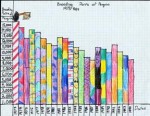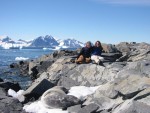Cindy Baker, Director of Publications, College of William & Mary
Some lucky 4th and 5th graders in Virginia got to experience the wilds of the Antartic from the comfort of their computer screens. While two College of William & Mary students joined the new Palmer LTER lead PI Hugh Ducklow on an Antarctic Peninsula research cruise this season, school children in Virginia participated via the World Wide Web.
Callie Raulfs and Mary Turnipseed, the first students from W&M to go to Antarctica, recorded journal entries about their impressions of the cruise, while Hugh Ducklow discussed the science.
Cindy Baker, director of publications at the W&M, organized a Web site for the classes (www.wm.edu/antarctica), adding new journal entries and photos from the Antarctic almost daily.
Pete Barnes, 5th grade teacher at Williamsburg/James City County Schools, incorporated the PAL LTER team research into his classes in a number of ways. His reading class wrote short stories based on information they read about Antarctica. His math class graphed the fluctuations in penguin populations culled from data Ducklow sent him and Barnes asked his science students to concoct animals with adaptations that could survive in the Antarctic. The results of these assignments were posted on the Web for the Palmer scientists to review.
“The most quantifiable outcomes of this project would probably come from my math class,” Barnes says. “I think my kids definitely benefited from graphing the penguin populations, Antarctic temperatures, and coordinate graphing of Antarctica. We took a test on all types of graphing, and the students did very well, better than last year’s group. The kids really took an interest in the fact that we were graphing real data as opposed to something assigned from a textbook. They made good hypotheses about the data and were able to answer higher-level questions about it.”
Language arts learning is more difficult to immediately quantify, Barnes said. “I think the kids benefited from reading extensively about Antarctica before writing about it. Once the kids learned that some of their stories would be on a Web site or sent to Prof. Ducklow, I think they took the writing more seriously. Sharing several different types of reading about Antarctica also helped the kids master the pertinent vocabulary and helped their comprehension.”
Lara Kesslers’ 4th grade students in the Charlottesville Public School system used the penguin data to do similar kinds of graphs. Her students diagramed an Antarctic food web and are examining the effects of global warming on the food web. They are also reading about the history of exploration in Antarctica. “My students have started to realize that the true purpose of learning—be it graphing raw data, studying the interdependent parts of an ecosystem, or drawing hypotheses from information—is to solve problems by asking pertinent and well-informed questions,” Kessler says.
“The authenticity of the data, the texts we’re reading, and the problem of global warming help my students recognize the applicability of the facts they’re learning, facts that are all too often divorced from reality. They are asked to act as scientists rather than students--sifting through data, analyzing it and reporting their findings. We are not just discussing the scientific process; we are participating in it!”
For Callie Raulfs, the contact with the public school students added dimension to her time in Antarctica. “The Web site and the chance to correspond with the fifth graders greatly enhanced my overall experience in Antarctica.”
The Richmond Times Dispatch gave the Web site “two thumbs up” for the journals and the student’s participation, and other teachers have approached Barnes and Kessler about joining the project when Ducklow and more WM students return to Palmer Station next research season.
“It was an engaging season with this year’s outreach participants adding to the growing diversity of Schoolyard LTER journaling efforts,” adds Karen Baker, Palmer LTER information manager and education/outreach cooordinator. “The team used a variety of electronic communications to deliver the excitement of ongoing Antarctic research experiences and data into new classrooms.”

 Enlarge this image
Enlarge this image
